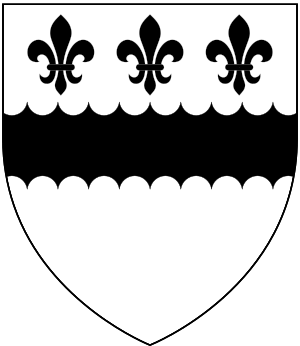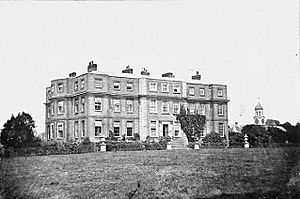Sir John Eyles, 2nd Baronet facts for kids
Quick facts for kids
Sir John Eyles, 2nd Baronet
|
|
|---|---|

Arms of Eyles: Argent, a fess engrailed sable in chief three fleurs-de-lys of the last
|
|
| Member of the Great Britain Parliament for Chippenham |
|
| In office 1713–1727 Serving with
|
|
| Preceded by |
|
| Succeeded by |
|
| Member of the Great Britain Parliament for City of London |
|
| In office 1727–1734 Serving with
|
|
| Preceded by |
|
| Succeeded by |
|
| Lord Mayor of London | |
| In office 1726–1727 |
|
| Preceded by | Sir Francis Forbes |
| Succeeded by | Sir Edward Becher |
| Personal details | |
| Born | 1683 |
| Died | 11 March 1745 |
| Resting place | St Helen's Bishopsgate |
| Political party | Whig |
| Parent |
|
| Relatives | Joseph Eyles (brother) |
Sir John Eyles (born 1683, died 1745) was an important person in British history. He was a successful businessman and a politician. He lived at Gidea Hall in Essex. Sir John was a Member of Parliament, which means he helped make laws for Britain, from 1713 to 1734. He even became the Lord Mayor of London in 1726.
He also held important roles in big companies. He was a Director of the East India Company for several years. Later, he became a sub-governor of the South Sea Company.
Contents
Early Life and Family
John Eyles was born in 1683. He was the second son of Sir Francis Eyles, 1st Baronet. His mother was Elizabeth Ayley. Elizabeth's father, Richard Ayley, was a merchant in the City of London.
John also had a younger brother named Joseph Eyles, who also became a Member of Parliament.
Sir John's Career in Politics and Business
Sir John Eyles had a busy career in both business and government.
Working with Companies
From 1710 to 1714, John Eyles was a Director of the East India Company. This company was very powerful and traded goods from places like India.
Later, from 1715 to 1717, he was a director of the Bank of England. This is the central bank of the United Kingdom. He served another term as Director of the East India Company from 1717 to 1721.
In 1721, he became a sub-governor of the South Sea Company. This was right after a big financial crisis called the South Sea Bubble.
His Time in Parliament
John Eyles was first elected as a Member of Parliament (MP) for Chippenham in 1713. He belonged to the Whig political party. He was re-elected for Chippenham in 1715 and always supported the government's decisions.
In 1716, he inherited the title of Baronet from his father. This meant he became "Sir John Eyles, 2nd Baronet." He was also appointed as a commissioner to manage estates that were taken by the Crown after the Jacobite rising of 1715. He held this job until 1725.
He was elected MP for Chippenham again without opposition in 1722.
Important Public Roles
In 1720, Sir John Eyles was appointed Sheriff of London. This was an important role in the city's government.
He was knighted in December 1724. Then, from 1726 to 1727, he served as the Lord Mayor of London. This is one of the highest honors in the City of London.
In 1727, he was elected as an MP for the City of London.
Later Years
Sir John Eyles did not run for MP in the City of London in 1734. He also lost the election in Chippenham that year.
However, he continued to serve the public. In 1737, he became an alderman for the Bridge Without ward. He was also made president of St. Thomas's Hospital in 1737. In 1739, he became a Joint Postmaster-General. He held both of these important positions until he died.
Gidea Hall: His Home
Sir John Eyles bought a large estate called Gidea Hall in Havering. In 1720, he tore down the old house there and built a new, very elegant home.
In 1731, a famous play called The London Merchant by George Lillo was dedicated to Sir John Eyles. A French writer, Abbé Prévost, who had been Sir John's secretary and tutor to his son, later used parts of this play.
Family Life
Sir John Eyles married Mary Haskin Styles. Mary was his first cousin. She passed away in 1735 and was buried in St Helen's Bishopsgate.
They had one son and one daughter. Their son was Sir Francis Haskins Eyles-Stiles, 3rd Baronet. He inherited his father's title.
Death
Sir John Eyles passed away on March 11, 1745.
 | Charles R. Drew |
 | Benjamin Banneker |
 | Jane C. Wright |
 | Roger Arliner Young |


